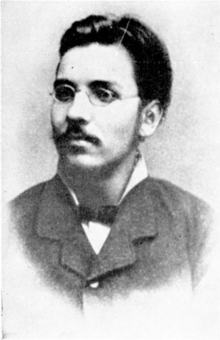Wilfrid Michael Voynich
Wilfrid Michael Voynich ( Belarusian Міхаіл Войніч, Michail Wojnitsch ; born October 31, 1865 in Hrodna , Russian Empire , as Michał Habdank-Wojnicz ; † March 19, 1930 in New York ) was a Polish revolutionary , book collector and antiquarian . He was best known for the discovery of the Voynich manuscript named after him .
Life
Voynich initially studied chemistry in Moscow, where he passed the exam and obtained a license to practice medicine. As a result Voynich was a member of the Polish national movement that fought for liberation from Russian oppression. Because of his involvement in an attempt to rescue two comrades sentenced to death, he was imprisoned in Warsaw in 1885 . Without being sentenced, he spent two years in solitary confinement. As a result of the severe detention conditions, a crooked shoulder and a general weakening of the constitution remained. On Easter Sunday 1887, looking out of a cell window, he noticed a young woman dressed in black standing at the foot of the citadel. It was his future wife Ethel Boole , daughter of the famous English mathematician George Boole and a young musician inflamed by the ideals of the anti-Tsarist freedom movement.
Shortly afterwards Voynich was sent into exile in Irkutsk in Siberia . After two failed attempts, he managed to escape. In an adventurous five-month odyssey, he finally came to London in October 1890, where Ethel Boole was one of the contact addresses given by friends in the Russian freedom movement.
At the end of the 1890s Voynich opened a second-hand bookshop in London (the first catalog appeared in 1898). He quickly gained a reputation for being able to source even the most remote works, and in the years that followed he opened offices in Paris, Florence and Warsaw. After his second-hand bookshop was initially located on Shaftesbury Avenue , he eventually had offices on Piccadilly . However, it is doubted whether the business success was based solely on Voynich's antiquarian gifts. A hidden function of the antiquarian bookshop was the distribution of revolutionary literature and the raising of funds for the Russian struggle for freedom. The antiquarian bookshop could have been a kind of money laundering facility for Polish and Russian freedom fighters.
In 1902 he married Ethel Lilian Boole, with whom he had been living since the mid-1890s.
In November 1914 Voynich traveled with the Lusitania to the USA to set up a second-hand bookshop in New York, where he settled permanently from 1915. His wife followed him a few years later, but no longer lived with him.
Before that, in 1912, he managed to find a book that would occupy him for the rest of his life and with which his name is primarily linked today: In the Villa Mondragone , the Jesuit college in Frascati , he discovered one in a puzzling one Scripture, richly illustrated manuscript now known as the " Voynich Manuscript ". The mysterious manuscript withstood all attempts to decipher its content to this day and has given rise to a myriad of controversial theories. One of these theories is that the manuscript is a forgery from Voynich's hand.
By the late 1920s, Voynich's business situation and health deteriorated. In 1929, while in England, he fell ill with pneumonia, from which he did not recover. After returning to the United States, Voynich died on March 19, 1930.
literature
- Gerry Kennedy, Rob Churchill: The Voynich Code. The book that nobody can read. Rogner & Bernhard, Berlin 2005, ISBN 3-8077-1009-4 .
- Evgeniia Taratuta: Po sledam "Ovoda". (Russian for "following the mosquito") Izd-vo "Detskaia lit-ra", Moscow 1972 (biography of Ethel Voynich).
| personal data | |
|---|---|
| SURNAME | Voynich, Wilfrid Michael |
| ALTERNATIVE NAMES | Michał Habdank-Wojnicz; Ivan Klecevsky (pseudonym) |
| BRIEF DESCRIPTION | American book collector and antiquarian of Polish descent |
| DATE OF BIRTH | October 31, 1865 |
| PLACE OF BIRTH | Hrodna , Russian Empire |
| DATE OF DEATH | March 19, 1930 |
| Place of death | New York City |
